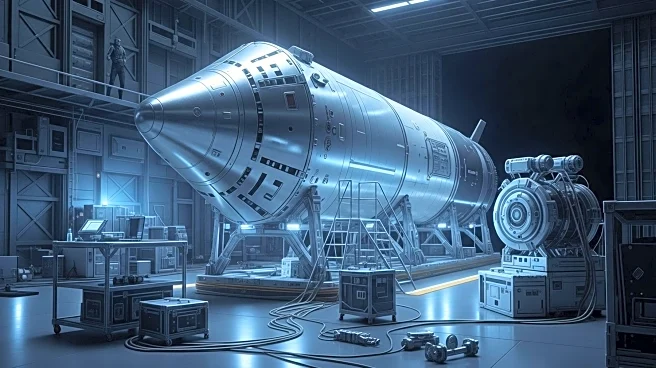What's Happening?
Blue Origin and Anduril Industries have been awarded contracts by the U.S. Air Force Research Laboratory (AFRL) to explore the use of commercial rockets for rapid global supply transport. Blue Origin received $1.3 million, while Anduril was granted $1 million under the Rocket Experimentation for Global Agile Logistics (REGAL) program. Blue Origin will focus on adapting its space vehicles for 'point-to-point' transport, which involves launching cargo payloads from one location and deploying them at specific destinations. Anduril's task is to design and analyze the integration of various government payloads into a rocket cargo delivery system. This initiative is part of AFRL's broader effort to utilize commercial launch systems for military logistics, aiming to deliver cargo anywhere on Earth in under an hour. The program envisions missions such as emergency supply deliveries to conflict zones or humanitarian aid during natural disasters.
Why It's Important?
The contracts awarded to Blue Origin and Anduril represent a significant step in the U.S. military's exploration of commercial rocket technology for logistics. This initiative could revolutionize military supply chains by enabling rapid deployment of resources, potentially transforming how the military responds to emergencies and conflicts. The use of commercial rockets for logistics could also lead to cost savings and increased efficiency, as the military would leverage existing commercial infrastructure rather than developing its own. This approach mirrors NASA's strategy of purchasing space transport services from private companies, which has proven successful in reducing costs and fostering innovation. The success of this program could have broader implications for the aerospace industry, encouraging further investment and development in commercial space technologies.
What's Next?
As the REGAL program progresses, Blue Origin and Anduril will conduct studies and analyses to determine the feasibility and practicality of their proposed solutions. The AFRL will likely evaluate the outcomes of these studies to assess the potential for operational implementation. If successful, the program could lead to further contracts and collaborations with other commercial space companies. The military's interest in commercial rocket logistics may also prompt additional research and development efforts within the aerospace sector, potentially leading to new technologies and capabilities. Stakeholders, including government agencies and private companies, will be closely monitoring the program's developments and outcomes.









